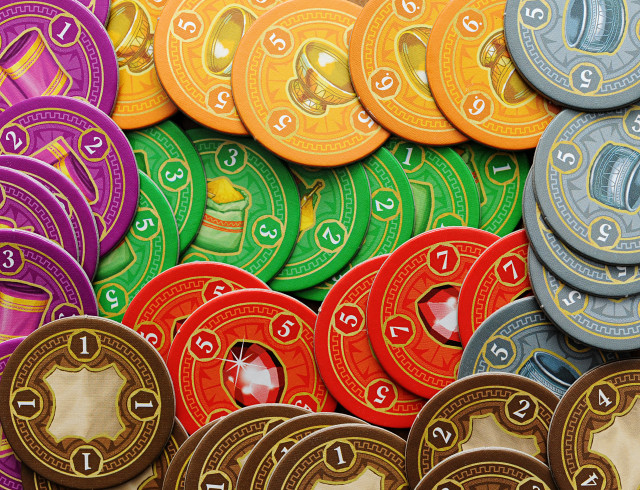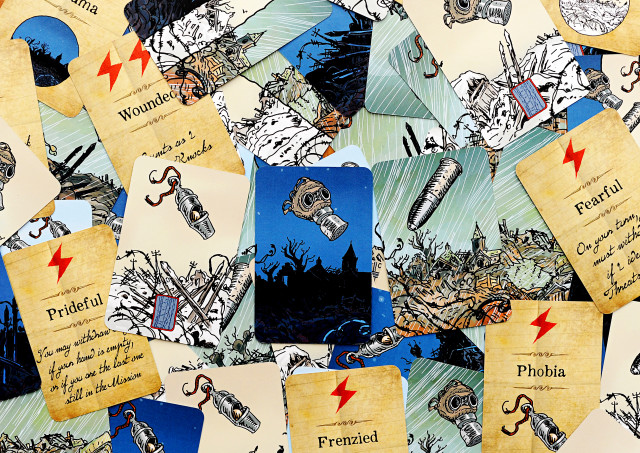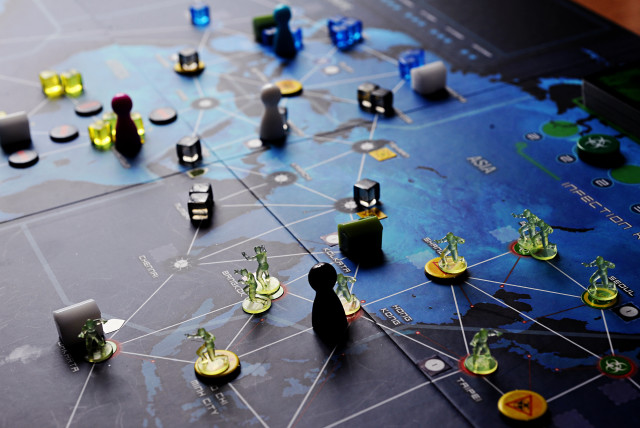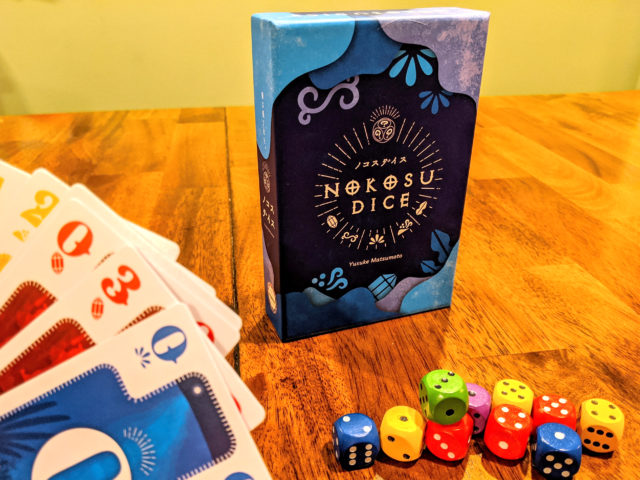Few humans can experience all of a year’s best games, much less a decade’s. Casting aside any desire for this to be a definitive roundup, I instead focused on games that taught me something and left a lasting expression. Some are brand new, some are from the dawn of the decade, and perhaps some will have the same effect on you.

Book-ending the decade is its best two-player game, with editions published in both 2010 and 2019. As Jaipur was already perfect, the game remains largely unchanged in this new printing, with exception of a slightly improved box. Jaipur stands the test of time by providing easy-to-teach gameplay with an incredibly simple turn structure, yet the experience is devoid of a boring turn. Every decision matters in a game of Jaipur.
In my early days of blogging, I wrote Confusion up as 2011 Game of the Year, and it still holds up as one of the more unique abstract games in my collection. As a capture-the-flag chess game with randomized movement rules, Confusion challenges you to deduce the identity of your own pieces through trial and error. Opponent checks the legality of each other’s attempted moves, but can throw the game for a loop by lying when the “double agent” piece is moved.
Confusion was one of the first titles published by Stronghold Games when they acted as a proto-Restoration Games, focusing exclusively on reprinting older games. The strong production (chunky Bakelite pieces!) and compelling gameplay showed that older games can still compete with the new hotness.

Thematic vs strategic gameplay once played out like a tug of war, at least until The Grizzled arrived in 2015. A simple co-op card game with beautiful art, The Grizzled depicting the trauma borne by soldiers of World War I. The experience of play proved to many that games can evoke feelings and tell stories without being obtuse and overly complex.
Honorable mention in this department should also go to the work of Cole Werhle (Root, Pax Pamir 2nd Edition, John Company, and An Infamous Traffic). While not as straightforward as The Grizzled, his works all did wonders in bringing a thematic experience to a wider audience.

One of the more conventional choices on this list, Pandemic Legacy earns its spot here for an unconventional reason: the number of game groups that racked up double-digit plays before moving on. Pandemic Legacy had the gameplay and story chops to reach the top of the BGG rankings, but it was the unique legacy elements that coaxed groups into playing entire campaigns. While far from the first game to ever include a campaign, Pandemic Legacy served the experience to a fresh audience unlikely to seek the high-conflict, miniatures-driven experience offered in most campaign-based games.

Introductions to Nokosu Dice are a delight, affording you the opportunity to watch eyes light up as players grasp the game’s twist on trick taking. An extra set of “cards” is drafted into each players hand in the form of dice (colored as one of several possible suits, and rolled to set value). The split of public information (dice on table) versus private (cards in hand) will have your brain burning on every turn. Unique systems for setting trump suits and scoring bonus bids act as icing on the cake.
In ten years, we’ll be writing about the first big trend of the ’20s (trick taking card games) and lamenting how none of that decade’s games could ever top Nokosu Dice. To be fair, the game is quite scarce, even with a second edition release late in 2019. With any luck, this game will see much wider distribution, with copies available in the meantime through specialty importer Big Cat Games. [Note: Check back soon for a full review of Nokosu Dice right here on Daily Worker Placement].
Microgames burst on the scene in 2012, chasing the success of Love Letter. The industry moved on quickly, but publisher Buttonshy Games to play out the long game. With its signature 18-card “wallet games,” Buttonshy has produced a wide catalog, but 2017’s Circle the Wagons stands out due the success of its modular scoring.
Each game begins by randomly selecting three of eighteen possible scoring conditions. This sort of variety is more often found as a hollow promise of replayability, papering over weak gameplay, but Circle the Wagons delivers a resounding success. The fact that this replay value can also fit in your pocket makes Circle the Wagons one of the decade’s standout games.

Expansions hold a strange place in my mind. A great game should hold up for tens (sometimes hundreds!) of plays, so what is the need for an expansion? Was the base game incomplete? Or is the publisher pushing out unnecessary content to cash in? All of these questions are pointless in the face of The Networks: Executives, the slayer of pedantic arguments. Executives serves up four significant changes without putting the burden on the players to mix and match through modularity. What emerges is an unquestionable improvement to what was already one of the decade’s best games (even the jokes get better!).

It took a while, but the party game scene eventually moved on from blurting out canned offensiveness. Creativity re-emerged, and the formula was perfected in two games so good that they forced the only tie in this list. Just One and Wavelength deliver a knockout combo: careful decisions, hilarious results, and the feeling of having gotten to know the others players just a little bit better. If you need help breaking this tie: Just One is better for play at a table while Wavelength wins when you’re hanging out on the couch.
Cube rail games exist in a sweet spot for the would-be train gamer: more cerebral thank a Ticket to Ride, without the lifestyle decision of falling down the 18XX well. Irish Gauge was originally a 2014 title from obscure and inaccessible publisher Winsome Games, but the game has more recently been brought to a wider audience through Capstone Games. But Capstone didn’t stop there, as Ian O’Toole was brought in to lay down a fresh coat of paint. O’Toole artwork improves most games, but here the flat yet crisp design is a natural evolution from the bare-bones minimalism of a Winsome production. Beyond the saga of its republication, Irish Gauge is simply a great game. As a shares-based economic game, it dethrones Chicago Express (another Winsome title brought to wider audience by Queen Games in the prior decade) by providing a streamlined gameplay and a touch of drama fuelled by random cube draws.
Comments
No comments yet! Be the first!